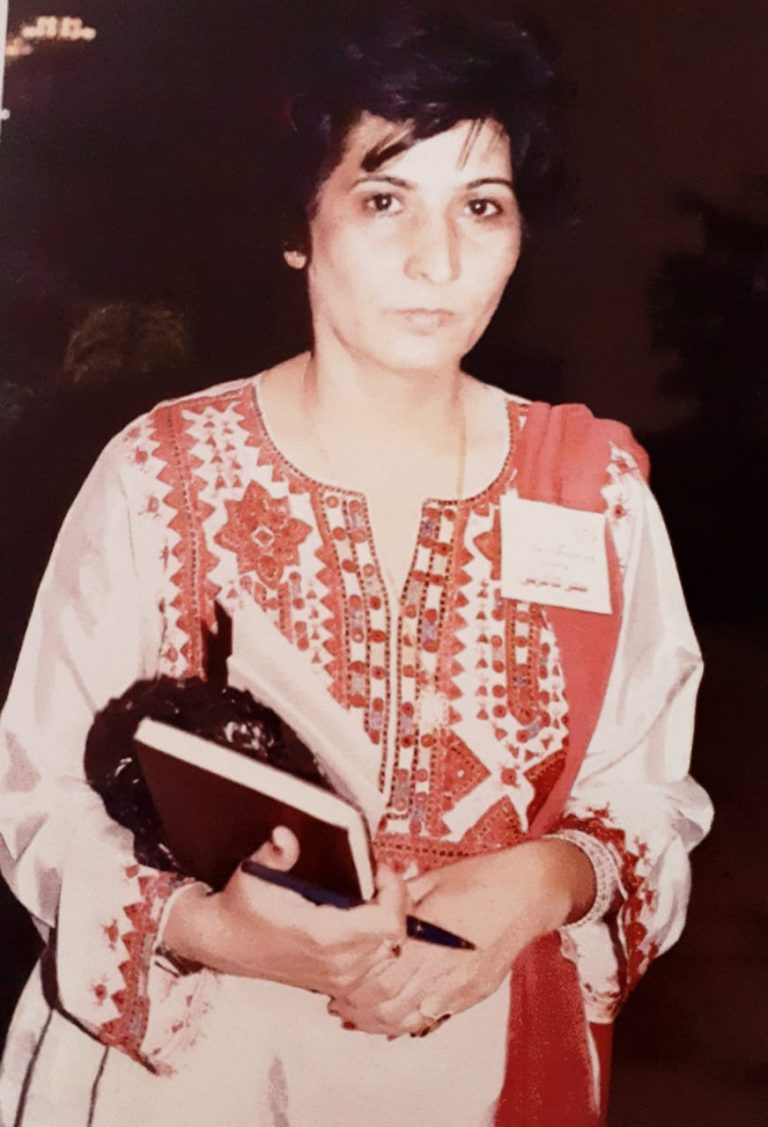
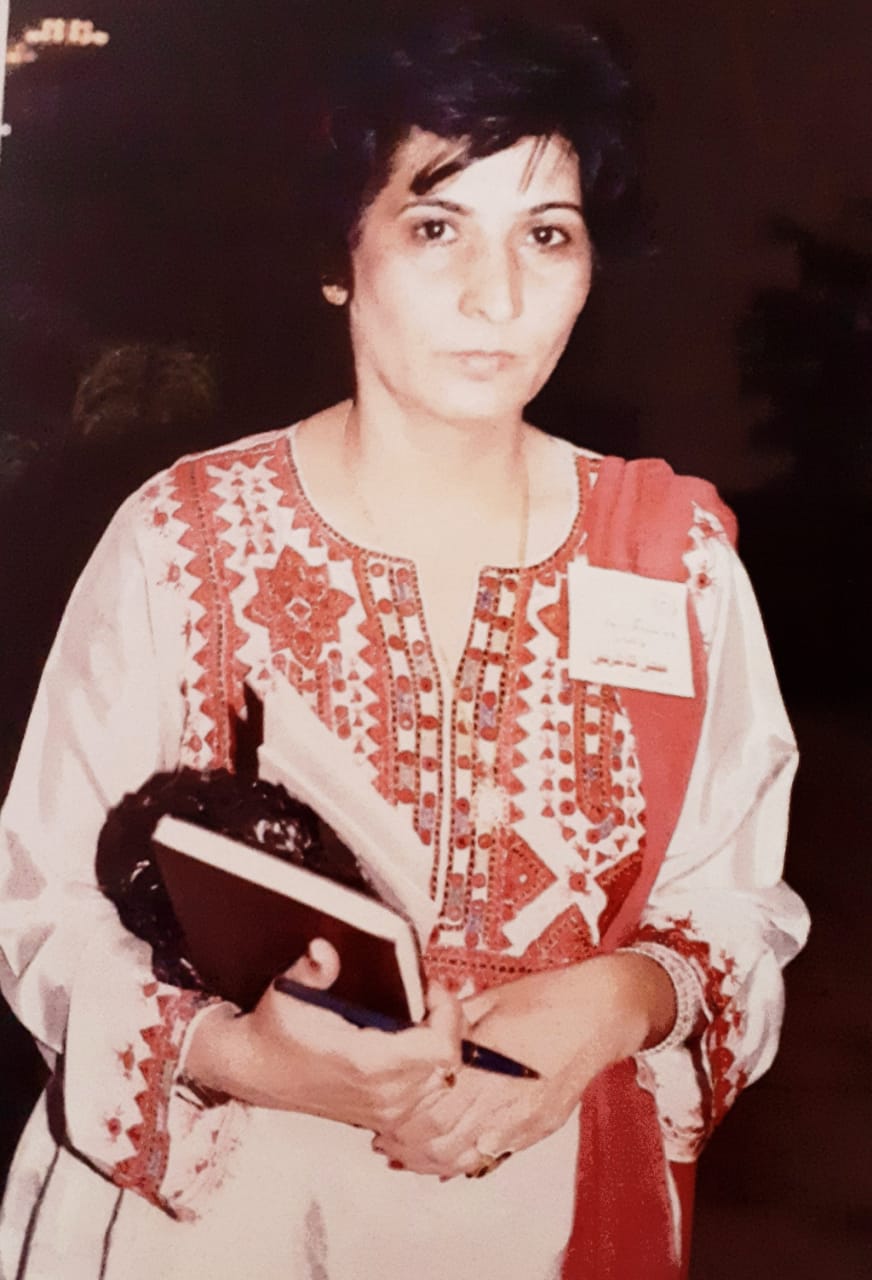 Veena Shringi, hailing from Sindh and settled in Delhi, India, is a multi-faceted personality – a poetess, writer, broadcaster, and social worker. She is author of 31 books. Her first book was ‘Kian Visariyan Verheechan’ (Can’t Forget My Loved Ones), the memoirs of her life from childhood to the time she migrated to India, published in Sindhi language in 1984. Now the English version of the same book is under publication. Sindh Courier is publishing a few chapters of book with consent of the author.
Veena Shringi, hailing from Sindh and settled in Delhi, India, is a multi-faceted personality – a poetess, writer, broadcaster, and social worker. She is author of 31 books. Her first book was ‘Kian Visariyan Verheechan’ (Can’t Forget My Loved Ones), the memoirs of her life from childhood to the time she migrated to India, published in Sindhi language in 1984. Now the English version of the same book is under publication. Sindh Courier is publishing a few chapters of book with consent of the author.
SHAHDADKOT – MY VILLAGE
There is a famous saying in Sindh, “If you have money, visit Larkana”. This saying is correct; it is because in Larkana there is Rice Canal. With the water of the canal, rice is cultivated, which makes Larkana a rich and prosperous town. The cultivation of rice not only fulfilled the local requirement, but it was exported to former East Pakistan (Now Bangladesh) before 1971. Rice is a staple-diet of Bengalis.
Almost similar is the situation in rest of Sindh. The meal is incomplete without rice. At least once in a day rice is a must – Lunch in the winter and dinner in summer. Eating rice with milk is a favorite food for Sindhis. Eating milk with rice was not compulsory, but it was eaten with delight. Those who cultivated rice were considered lucky. Ours was one of the few lucky families who were owners of rice fields. Our rice fields were near the village Tando, which was midway between Larkana and Kambar. Shahdadkot is a large market place for trading in grain. All the nearby landlords and cultivators used to bring their grain for sale in the Shahdadkot market. At the harvesting time, there used to be a lot of traffic of bullock carts and camels in the Shadadkot market. Harvest time was money-minting time for the traders. The traders used to send wagons full of goods to various places. All the visitors to the market used to return home with goodies for the family.
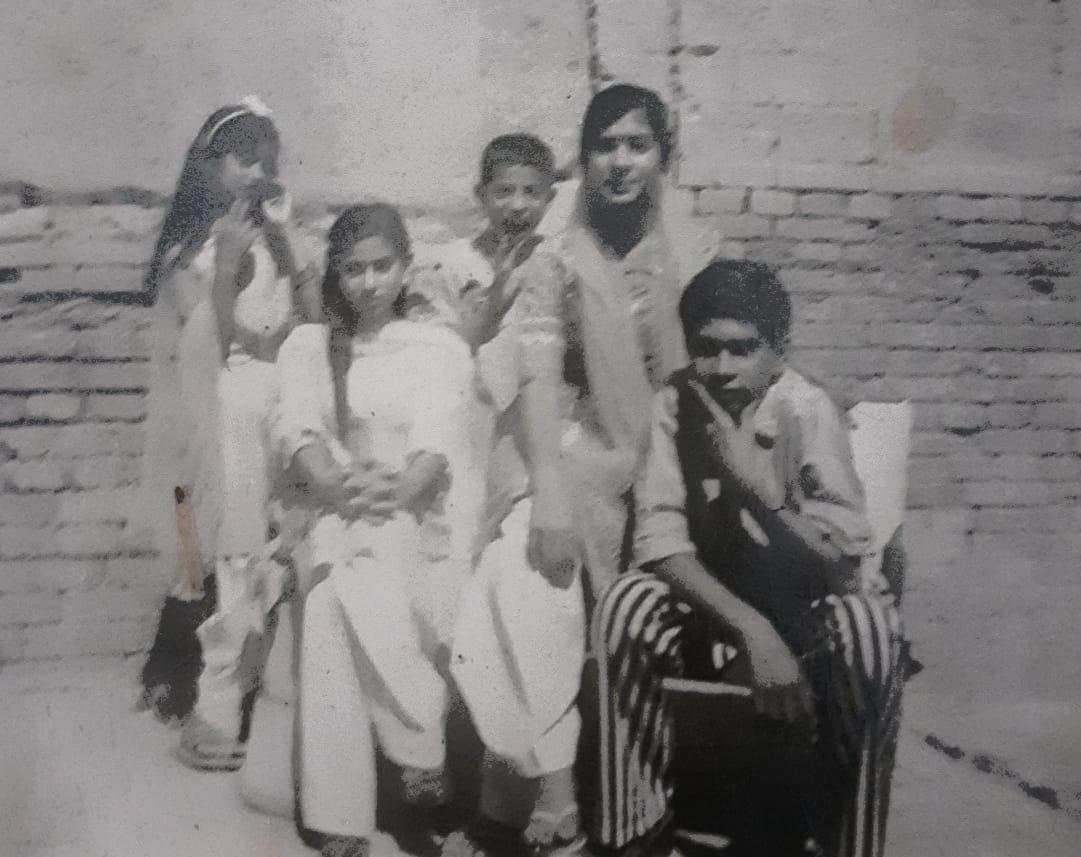
Our fields near village Tando were very fertile and spewed gold. Bundles of currency notes were brought home after harvest. Some people used to divert our water to their fields. Often there were disputes over water for cultivation. Ameer Bux was the caretaker for our fields. He belonged to the Birohi tribe, a tribe of brave people. He used to carry an axe and a gun, which was enough to scare away the troublemakers. Ameer Bux was the owner of fields also and was the chief of his Birohi tribe. The arrival of Ameer Bux turned out to be very valuable for us. Since Ameer Bux was the chief of his tribe, he migrated to our village along with about fifty families of his tribe.
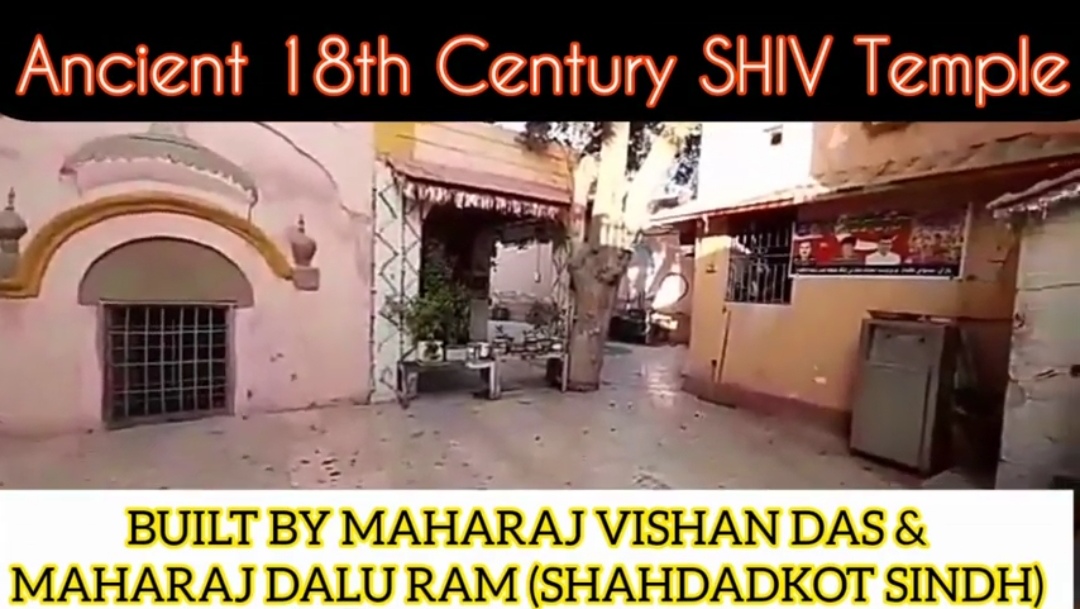 Ameer Bux was different from local Muslims. He sported a grey long beard, and was a tall man with fair skin, a long and sharp nose and blue eyes; he looked like a person from Tashkent or Russia. Whenever he visited our home, we all felt very happy. Though we did not observe covering our faces like Muslims, in our home there was a restriction on the entry of menfolk, especially the Muslims. Despite this there were exceptions. Certain persons were treated like family members and there was no restriction for them. Ameer Bux was one of them. He was the caretaker of our fields, and he used to bring bundles of currency and give to my mother. My mother used to stuff that money in the old and rusted iron vault. It contained cash, silver utensils, and ornaments for the gods which belonged to my forefathers. It appears not only the men but the gods also started to envy us.
Ameer Bux was different from local Muslims. He sported a grey long beard, and was a tall man with fair skin, a long and sharp nose and blue eyes; he looked like a person from Tashkent or Russia. Whenever he visited our home, we all felt very happy. Though we did not observe covering our faces like Muslims, in our home there was a restriction on the entry of menfolk, especially the Muslims. Despite this there were exceptions. Certain persons were treated like family members and there was no restriction for them. Ameer Bux was one of them. He was the caretaker of our fields, and he used to bring bundles of currency and give to my mother. My mother used to stuff that money in the old and rusted iron vault. It contained cash, silver utensils, and ornaments for the gods which belonged to my forefathers. It appears not only the men but the gods also started to envy us.
Some close relatives, or maybe his son had murdered someone. Because of this Ameer Bux became dejected and was always worried. He lost interest in money and became recluse. He was above fifty years of age, but his vigor and vitality were much better than the young. His roar was enough to frighten several. One day he told my father, “Sir, now I wish to leave this town. Kindly permit me.” Hearing this we all got disturbed. We all did not want him to leave our town. Due to our love and affection, he gave up the idea of migrating from our town for the time being.
It so happened that our crop ready for harvesting got infected with pests. The entire crop was lost. This happened at a stretch for three years. Due to the heavy loss, we used to apply to the government for relief in revenue recovery. The district officers used to press us for payment of taxes. On the other hand, Ameer Bux, who was completely disinterested in the work, once again requested my father to allow him to go to his village. Reluctantly my father allowed him to go to his village to meet his family. With eyes wet, he bid us goodbye.
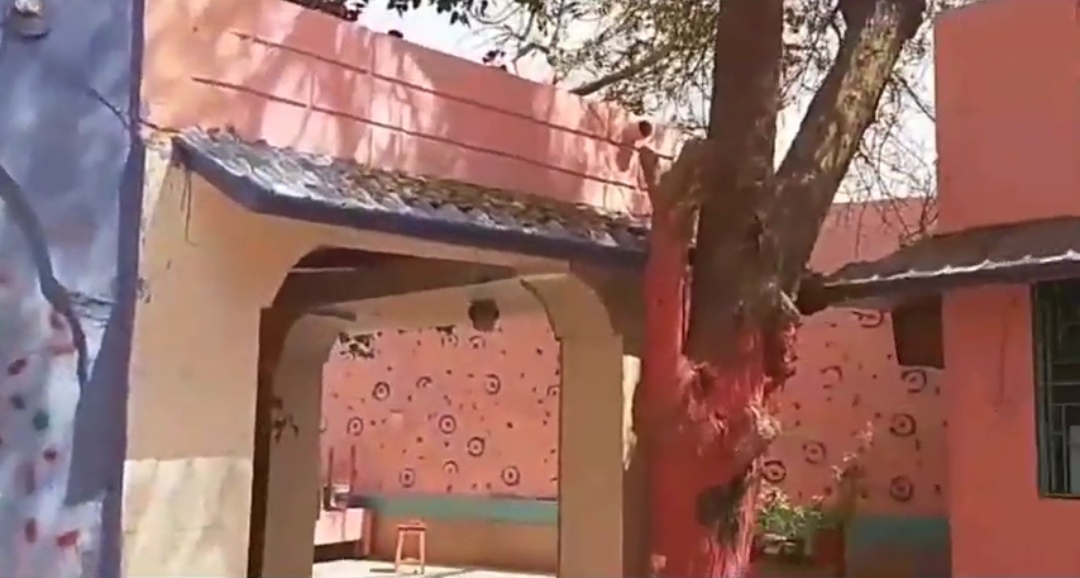 It was not only Ameer Bux who left, but it seems our luck also departed. Our very fertile rice fields became fallow lands. This went on for more than ten years. There was a time when local landlords were eager to purchase our land at a huge price. Besides the rice fields, we owned several other properties. We had shops in Shadadkot. We owned a hotel also. We had rented out one building to the government for the post office. We were a well-known family in Shadadkot. Only our name was enough on the postcard to reach us. We were getting rent from our properties, but it was not sufficient for our needs. It was because many guests used to visit our home very frequently. Feeding and taking care of the guests cost us a lot of money. We had a saying ‘Atithi Devo Bhava’ means ‘Guest is God’. Our guests were Hindus as well as Muslims. We made no distinction. Though we were short of money, the guests were treated with love and care. Many friends used to tell mother and father that there is too much traffic of guests in our home. “Your kitchen is always open even for strangers.” Such advice did not affect my parents. They were immune to it and continued with the hospitality for the guests with a smile. We had plenty of gold. But, due to the shortage of money, it started depleting. We used to purchase seeds and manure for sowing the fields. Since we were short of cash, we had to borrow money on interest to keep things going. But, just before harvesting, the crop got destroyed by swarms of locusts or some pests. The net result was that there was no income from the fields. Probably, that time was the worst period of our life. My mother used to say, “It appears our family has been cursed by someone.”
It was not only Ameer Bux who left, but it seems our luck also departed. Our very fertile rice fields became fallow lands. This went on for more than ten years. There was a time when local landlords were eager to purchase our land at a huge price. Besides the rice fields, we owned several other properties. We had shops in Shadadkot. We owned a hotel also. We had rented out one building to the government for the post office. We were a well-known family in Shadadkot. Only our name was enough on the postcard to reach us. We were getting rent from our properties, but it was not sufficient for our needs. It was because many guests used to visit our home very frequently. Feeding and taking care of the guests cost us a lot of money. We had a saying ‘Atithi Devo Bhava’ means ‘Guest is God’. Our guests were Hindus as well as Muslims. We made no distinction. Though we were short of money, the guests were treated with love and care. Many friends used to tell mother and father that there is too much traffic of guests in our home. “Your kitchen is always open even for strangers.” Such advice did not affect my parents. They were immune to it and continued with the hospitality for the guests with a smile. We had plenty of gold. But, due to the shortage of money, it started depleting. We used to purchase seeds and manure for sowing the fields. Since we were short of cash, we had to borrow money on interest to keep things going. But, just before harvesting, the crop got destroyed by swarms of locusts or some pests. The net result was that there was no income from the fields. Probably, that time was the worst period of our life. My mother used to say, “It appears our family has been cursed by someone.”
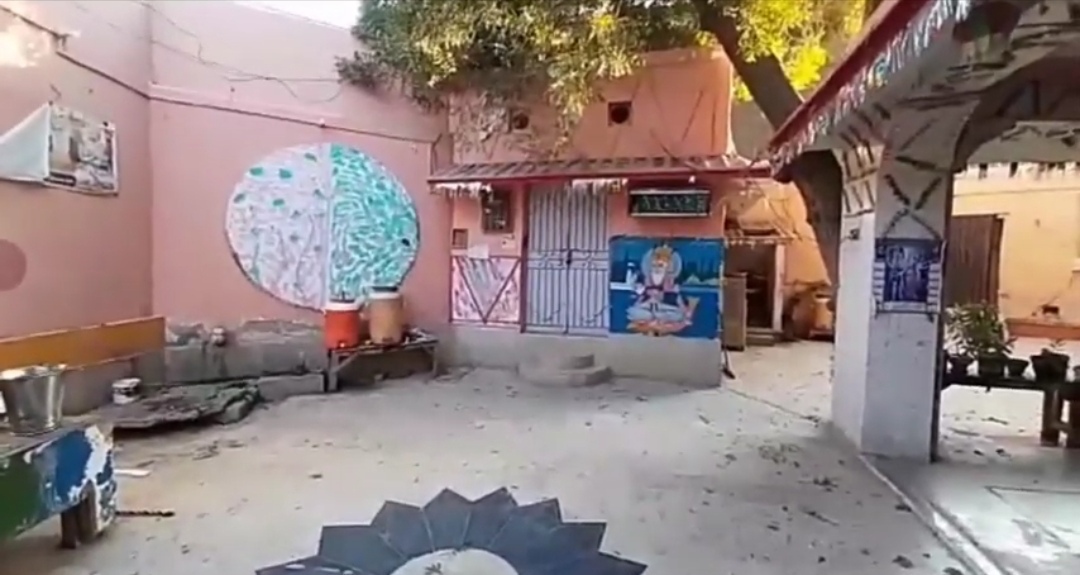 After Ameer Bux left, we got a new caretaker for our fields. His name was Jalal Khan. The caretaker Jalal Khan who was as good as our family member used to bring some sacks of grain and fresh vegetables. Thus, our home and our kitchen could survive. Our fields in Tando originally belonged to one Kishordas, who had no heirs. Our grandfather was the nearest kin. Hence, our grandfather became the owner of the fields. My mother used to say, “We should have given away the fields to someone; or we should have sold the fields and got a temple built at Haridwar.” Because of losses there used to be some quarrel between my father and mother. But, the quarrel used to be of a different kind. There were no harsh words or cuss words, nor were there any threats. Sometimes, we the children, our grandfather too, used to instigate mother telling her to revolt against the hospitality which was beyond limits. It was just to have fun. Reply from my mother was, “To revolt is not the trait of women from a good family.”
After Ameer Bux left, we got a new caretaker for our fields. His name was Jalal Khan. The caretaker Jalal Khan who was as good as our family member used to bring some sacks of grain and fresh vegetables. Thus, our home and our kitchen could survive. Our fields in Tando originally belonged to one Kishordas, who had no heirs. Our grandfather was the nearest kin. Hence, our grandfather became the owner of the fields. My mother used to say, “We should have given away the fields to someone; or we should have sold the fields and got a temple built at Haridwar.” Because of losses there used to be some quarrel between my father and mother. But, the quarrel used to be of a different kind. There were no harsh words or cuss words, nor were there any threats. Sometimes, we the children, our grandfather too, used to instigate mother telling her to revolt against the hospitality which was beyond limits. It was just to have fun. Reply from my mother was, “To revolt is not the trait of women from a good family.”
My mother’s father, our Nana, was an honorary magistrate at Karachi and our Nani was an illiterate woman from the village Boobak. But, she was a wise lady, good at running her household and bringing up the family. Our Nana got married twice, as he became a widower. Later my Nani also became a widow at the young age as there was a vast difference between the age of our Nana and Nani. My mother was the youngest of the siblings, and Nani had instructed her not to raise her voice at any point in time.
My mother’s upbringing was done in a large city Karachi. But, after marriage, she adapted herself to accept life in a small town Shahdadkot. At Karachi, my mother was captain of Women’s Wing of Congress Party of the Old Town branch. She used to take the women and girls of Old Town to the gatherings which had distinguished guests like Lady Haroon, Shiv Ratan Mohta, and Seth Ratanchand. Mahatma Gandhi, Sabhash Chander Bosh, Sarojni Naidu, Sir Raman Bhai used to used to stay at the house of Shiv Ratan Mohta, who was a rich Marvari family.
 Once, my mother went along with Jethi Sipahimalani, a well-known political and social worker, to agitate against the use of European goods. They went to a shop where the shopkeeper challenged Jethi Sipahimalani as she was wearing an imported watch on her wrist. He said, “Madam, you are wearing an imported watch and asking us to shut down our shops and deprive us of our livelihood. First, take off your watch and then talk to me.” My mother tried to cool down the angry shopkeeper. The shopkeeper replied “Sister Sati, I can see that you wear Khadi. But, this lady has no right to sermon me.” With this Jethi Sipahimalani felt embarrassed.
Once, my mother went along with Jethi Sipahimalani, a well-known political and social worker, to agitate against the use of European goods. They went to a shop where the shopkeeper challenged Jethi Sipahimalani as she was wearing an imported watch on her wrist. He said, “Madam, you are wearing an imported watch and asking us to shut down our shops and deprive us of our livelihood. First, take off your watch and then talk to me.” My mother tried to cool down the angry shopkeeper. The shopkeeper replied “Sister Sati, I can see that you wear Khadi. But, this lady has no right to sermon me.” With this Jethi Sipahimalani felt embarrassed.
In Karachi, Jethi Sipahimalani, Sati Shahani, and Savitri Advani held my mother in high esteem. They used to appreciate the services rendered by my mother. My mother had collected a donation of five hundred rupees for Flood Fund in those days when one rupee was equivalent to today’s hundred rupees. My mother was known as ‘Sati Sister’ and she had earned respect from all the quarters. Sadhu Vaswani had written a book where he had mentioned names “Sati and Savitri”. Sati is my mother and Savitri is the daughter of my mother’s brother. Sati and Savitri were known as ‘Jaitley Sisters’ in Karachi.
My mother gave up a fabulous life in Karachi and accepted to live with my father in Shahdadkot, a small village like a town. She always stood by my father in thick and thin. Interest upon the loans taken was piling up by the day. My father was neither agreeable for selling the ancestral fields nor was he able to find some other means of income. Once, my mother got angry and said that our fields are at the mercy of dacoits, the money lenders. My father laughed at this. To Jalal Khan he said, “She is reading novels the whole day. Her brain has got affected.”
We, the children also were not happy with the submissive nature of our mother. Mother’s arguments were always convincing, but it was the father who won, because he was a man, and he had status in the society.
People used to count us amongst millionaires. But, we lost the status because of the honesty and simplicity of my father. My father had enjoyed various posts in committees and social organizations. Now, he was eased out from those organizations.
Ten years of misery made us strong in away. We learned to face the world. Also during the trying period, we came to know the friends and foes. We saw the true colors of society.
When the revenue officer used to come to our house to collect the taxes, we used to get upset. My father used to say, “Don’t worry, we will pay the taxes.” Outwardly mother and father used to hearten each other, but within, they both were heartbroken. Jalal Khan was always compassionate no matter what the situation. His friends used to taunt him that living with Hindus, he had become an infidel. Jalal Khan was a pious Muslim and was a very good human being. Jalal Khan was aware of everything that happened in our house. There may be certain things of which even I was not aware of.

When the revenue officer, who is called Tapedar, visited with his lackeys, Jalal Khan used to get busy serving them. We are Brahmin and are strictly vegetarian. But for the Tapedar and his sycophants, we used to get mutton from the hotel. The Tapedar used to say that he may die of hunger but will not touch vegetarian food. Tapedar is a very small officeholder. But, his way of dress and behavior was more than an aristocrat. He used to sport a heavy gold chain in his neck, a few gold rings, and an imported watch. His clothes too were expensive.
In our town, there used to be a man named Bago. He was a con man. He wanted to pose as a learned man from high society. My grandfather used to tell us that once Bago came and said that there is a lion in the nearby jungle. The people got worried and were afraid. My grandfather was an intelligent person. He told Bago, “Near Kambar there is no forest. All around there are cultivated fields and some bushes. The presence of a lion in our area is just not possible”. Bago insisted that there is a lion in the area. But later he relented. Thereafter, the name “Bago, the liar” became famous in the area.
These are a few of my memories of my town Shadadkot where I was born and brought up.
____________________